
How Do Nevada Asset Protection Trusts Work? Benefits, Risks & Key Facts
Nevada Asset Protection Trusts (NAPTs), also known as Nevada Domestic Asset Protection Trusts (DAPTs), are among the most powerful legal tools for shielding your wealth from lawsuits, creditors, and judgments. If you’re serious about protecting your assets and securing your legacy, understanding how a Nevada Asset Protection Trust works—and why Nevada is the gold standard—is essential.
What Is a Nevada Asset Protection Trust?
A Nevada Asset Protection Trust is a self-settled spendthrift trust. This means you can create the trust, transfer your own assets into it, and still be a beneficiary—while enjoying some of the strongest creditor protections in the United States. Once assets are in the trust and the statute of limitations has passed, most future creditors cannot reach them.
Why Choose a Nevada Asset Protection Trust?
1. Unmatched Creditor Protection
Nevada law offers a two-year statute of limitations for most creditor claims. After this period (or six months after a creditor discovers the transfer, whichever is later), assets in the trust are generally protected—even if you’re the beneficiary. Nevada’s laws are considered among the most favorable in the country for asset protection.
2. No State Income Tax
Nevada imposes no state income tax on trust assets, making it attractive for high-net-worth individuals and families seeking tax efficiency.
3. Privacy and Confidentiality
Nevada statutes provide strong privacy protections for trust documents and administration, helping keep your financial affairs confidential.
4. Flexible Trust Design
You can appoint a trust protector (an independent party who can oversee or amend the trust), use trust decanting to restructure the trust without court approval, and include custom provisions for family, business, or charitable goals.
5. Self-Settled Spendthrift Trust
Unlike most states, Nevada allows you to be both the settlor and a beneficiary, retaining some access to trust assets while still enjoying robust protection.
How Does a Nevada Asset Protection Trust Work?
Trust Creation:
You (the settlor) work with an attorney to create an irrevocable trust under Nevada law. You must appoint a qualified, independent Nevada trustee.
Funding the Trust:
You transfer assets—such as real estate, investment accounts, business interests, or cash—into the trust. The trust becomes the legal owner.
Statute of Limitations:
After two years (or six months after a creditor discovers the transfer), assets are generally protected from most future creditor claims. This “seasoning period” is critical for the trust’s effectiveness.
Trust Administration:
The Nevada trustee manages the trust, makes distributions, and ensures compliance with Nevada law. You can be a beneficiary and receive distributions, but you cannot demand them.
Beneficiaries:
You, your spouse, children, or others can be named as beneficiaries. The trust can also provide for future generations or charitable causes.
Key Features and Terms
Irrevocable Trust: Once assets are transferred, the trust is generally irrevocable, maximizing protection.
Trust Protector: An optional party who can oversee, amend, or even replace the trustee for added flexibility.
Trust Situs: The trust must be administered in Nevada by a qualified Nevada trustee.
Spendthrift Clause: Prevents beneficiaries’ creditors from accessing trust assets.
Trust Decanting: Allows the trustee to “pour” assets into a new trust with updated terms, without court involvement.
Common Uses for Nevada Asset Protection Trusts
Wealth Preservation: Protect assets from lawsuits, divorce, or business risks.
Estate Planning: Pass wealth to heirs efficiently and privately, avoiding probate.
Business Succession: Safeguard business interests and ensure smooth transitions.
Privacy: Keep sensitive assets and family matters out of public record.
Special Needs Planning: Provide for vulnerable family members without jeopardizing benefits.
Potential Risks and Considerations
Fraudulent Conveyance: Transfers made to hinder existing creditors can be challenged in court. NAPTs are not a shield for debts you already owe.
Trust Costs: Legal fees, trustee fees, and ongoing administration costs apply. These are typically outweighed by the protection and tax benefits for larger estates.
Strict Compliance: Nevada law must be followed precisely. Using an experienced attorney is essential.
Not Bulletproof: While Nevada offers top-tier protection, no trust is 100% immune to all claims (e.g., child support, alimony, or certain federal claims).
Is a Nevada Asset Protection Trust Right for You?
If you have significant assets, face professional liability, or simply want to ensure your wealth is protected for future generations, a Nevada Asset Protection Trust is one of the most effective strategies available. It’s especially popular with business owners, physicians, real estate investors, and anyone concerned about lawsuits or creditor risks.
How to Set Up a Nevada Asset Protection Trust
Consult an experienced estate planning attorney familiar with Nevada law.
Identify the assets you want to protect.
Select a qualified Nevada trustee (individual or trust company).
Draft and execute the trust agreement.
Transfer assets into the trust and document the transfers.
Wait out the statute of limitations for full protection.
Final Thoughts
Nevada Asset Protection Trusts offer unmatched legal protection, privacy, and flexibility for those serious about safeguarding their wealth. With the right planning and professional guidance, you can shield your assets from future threats and create a lasting legacy for your family.
Sources:
© Copyright 2025 – CPA Attorney


